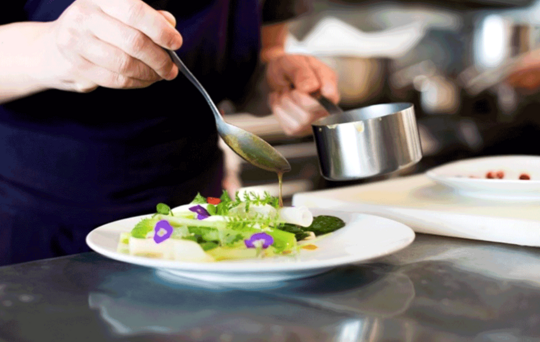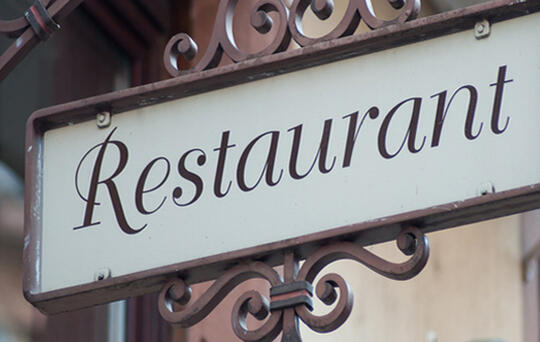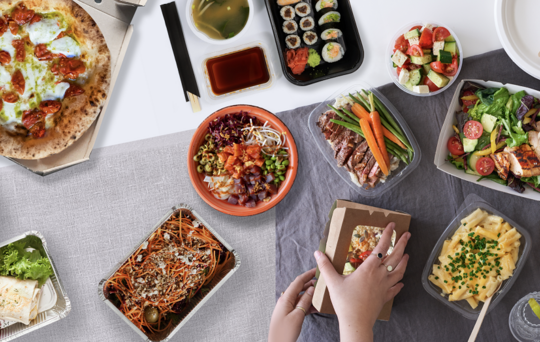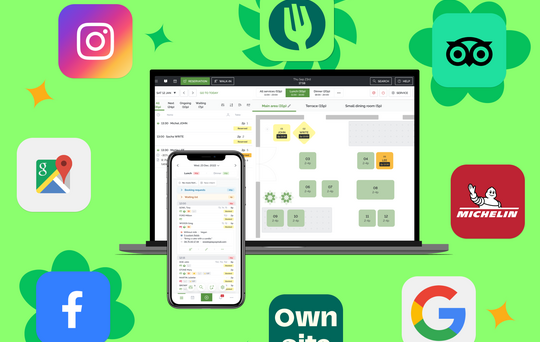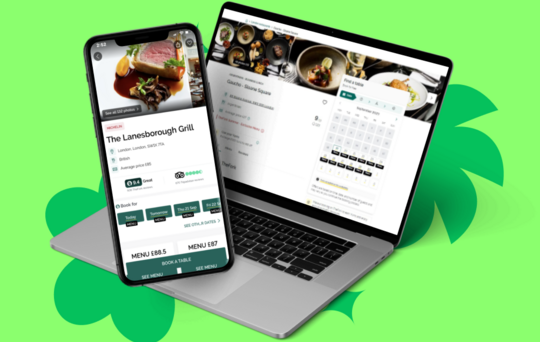The ultimate guide to restaurant marketing in the UK

- • What is restaurant marketing?
- • Restaurant marketing objectives
- • Understanding the marketing mix: 4 Ps restaurant
- • Try TheFork Manager today
- • Effective restaurant marketing strategies
- • Tips for successful restaurant marketing
- • Resources for restaurant marketing
- • Empty tables and ever-increasing costs?
In 2024, restaurants need to reach for new heights of sophistication by experimenting with unconventional techniques and new culinary technological — especially in the UK, where competition is fierce.
Whether you manage a quaint café in the city, a bustling bistro, or a fine dining establishment in the most upscale part of town, it is essential to fully grasp the key concepts of restaurant marketing. By understanding the main principles of restaurant marketing, you can implement effective strategies to help you succeed in attracting new customers, retaining your current customer base, and most importantly, getting one-up on your competitors.
This guide provides actionable tips, practical examples, and tools that will help your restaurant reach its potential.
What is restaurant marketing?
When we talk about restaurant marketing, we mean the promotional and positioning activities an establishment undertakes to obtain more visibility.
As a result of effective strategies, restaurants can benefit from:
- Enhanced value proposition
- Bolstered brand image
- More coherent brand identity
- Impactful communication across multiple social media channels
Restaurant marketing also involves crafting a compelling storyline that deeply resonates with the chosen target audience. Alongside a well-executed marketing plan, you can boost your restaurant’s attractiveness, leading to higher customer numbers and increased turnover.
Restaurant marketing objectives
Navigating the UK restaurant industry can be challenging. To have a strong chance at success, it is key to define goals that will encourage the growth of your business. But why prioritise advertising, and how can restaurant marketing help to fill all your tables even during off-peak hours and, consequently, reduce no-show rates?
First, set achievable objectives that highlight your restaurant’s Unique Value Proposition (UVP) for your target audience. Refer to the SMART criteria as a guide, which states that every objective has to be specific, measurable, attainable, relevant and time-bound. For instance, a goal for your restaurant might be to increase weekday lunchtime booking by 20% over the next three months.
Subsequently, monitoring results on a regular basis is also a core aspect of setting restaurant marketing objectives. This is where technology comes into play. Accessible and cutting-edge tools, such as TheFork Manager, can provide you with:
- Valuable figures sourced from detailed reports
- Tracked booking patterns
- Detailed customer preferences
- No-show rates
Understanding the marketing mix: 4 Ps restaurant
Have you ever heard of the Marketing Mix? It is one of the foundations of effective restaurant marketing strategy development and consists of four ‘P’s:
- Product: Crafting a high-quality menu with seasonal, local ingredients will cater to the tastebuds of even the most diverse audiences, while also piquing their curiosity.
- Price: Keep your restaurant's prices competitive by offering lunch specials or happy hour deals. Implementing a tiered pricing strategy will encourage repeat visits.
- Place: Customers more easily perceive accessible and visible establishments as comfortable and inviting. To make your menu even more accessible, consider delivery and take-away options.
- Promotion: Raise awareness and enhance engagement by putting targeted restaurant marketing activities in place. Host events, create loyalty programs and outline social media, email campaigns and local partnerships.
Expanding the mix: the 7 Ps of restaurant marketing
In the last few years, the Marketing Mix has evolved to include three more elements:
- People: this ‘P’ is about your staff’s knowledge and experience. Investing in training is crucial to obtaining customer satisfaction and, ultimately, loyalty.
- Processes: quick orders and delivery, excellent complaint handling, reduced wait times, increased table turnover, and high-quality service are the secret ingredients for perfect restaurant management.
Physical environment: atmosphere, décor, cleanliness, lighting, and music all contribute to enhancing your customers’ experience.
Try TheFork Manager today
Effective restaurant marketing strategies
Nowadays, restaurant marketing strategies blend traditional, digital, and creative techniques. A multifaceted approach can make a distinct difference in the current culinary context, as it allows experiments in and out of the kitchen and a guaranteed, long-lasting success.
Restaurants and “traditional” marketing
Despite the rise of digital marketing, traditional restaurant marketing techniques remain highly relevant in the industry. As an emerging new business, good public relations, word-of-mouth publicity, and personal recommendations from satisfied customers are invaluable.
To build a strong reputation and raise your business profile, local advertising in magazines, newspapers, radio, and TV can help promote your establishment. Seasonal offers, charity fundraisers, and special events can also help to fan the flames of your success!
Web marketing for the restaurant industry
In today's digital age, restaurant marketing has expanded, taking strategies online across several channels. Showcasing mouth-watering pictures of your dishes on Instagram, sharing behind-the-scenes content on TikTok and directly engaging customers with Stories all contribute to keeping viewers positively engaged.
Another powerful tool is e-mail marketing. Sending targeted newsletters allows you to attract and retain customers by getting in touch with them and designing tailored storytelling. This is only the beginning to create a continuous dialogue that goes beyond simple promotions or invitations.
Search Engine Optimization (SEO) is an asset that can optimise your restaurant visibility to boost your business and drive organic traffic to your website. Additionally, customers are now more regularly utilising online booking platforms — such as TheFork — meaning that having a good internet presence allows restaurants to gather valuable data insight while also boosting bookings and creating a loyal customer base.
The new frontiers of restaurant marketing
Do you feel like you’ve reached the limits of your success with conventional marketing strategies? Then you should embrace creative restaurant marketing strategies to make your activity stand out in the industry.
Guerrilla marketing may be the perfect unconventional approach and a perfect fit for you if your goal is to create a buzz and catch customers’ attention. Many restaurateurs across the UK have decided to use this strategy to boost their activity. Flash mobs have been a huge hit in the past few years, dancing in unison, performing in random places, and mesmerizing crowds.
If social media marketing works for your business, consider influencer marketing. The principle is similar to word-of-mouth but across social media channels. Influencers suggest items to followers, including clothes, restaurants, places to visit, while also endorsing their sponsors and leveraging their reach and credibility.
Virtual reality (VR) and augmented reality (AR) can also set your restaurant apart, offering immersive previews of your dining space or interactive menus. This will make your customers' engagement skyrocket.
Tips for successful restaurant marketing
Being successful requires working on various areas of your business at the same time. Here, you can find a series of marketing best practices you can easily implement to boost your restaurant.
- Understand your target audience. It is crucial to be aware of their tastes, culinary culture, background and habits to enhance their experience with a tailored approach.
- Define your brand identity, making your restaurant instantly recognisable in the eyes of potential customers.
- Develop a 360° marketing plan. This will outline your objectives and tools for measuring your advancements. Elevate your management approach with TheFork Manager — a user-friendly, multi-faceted online platform.
- Fine-tune your restaurant marketing strategies based on data for effective, long-term results.
Resources for restaurant marketing
Finally, we want to present you with a broad array of useful resources that can become essential for your restaurant marketing plan.
- Consult industry reports, such as those by the National Restaurant Association, which deliver a thorough analysis of market trends and consumer behaviour.
- Make the most out of marketing templates and guides available through specialised platforms, such as HubSpot and TheFork Manager, to streamline your campaign planning and execution.
- Enhance your restaurant awareness online through tools that provide robust social media analytics (e.g. Hootsuite).
Always keep up-to-date with the latest strategies to attract more guests and success stories by following blogs like The Foodhaolic or GourmandGunno.





